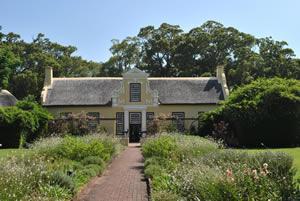 South Africa offers a blend of cities, countryside, and varied wilderness eco-systems showcasing a land of many splendours.
South Africa offers a blend of cities, countryside, and varied wilderness eco-systems showcasing a land of many splendours.
South Africa has seldom been out of the headlines in our lifetime.This complex country has 11 official languages and is a first, second and third-world country rolled into one. It has a mix of races, tribes, religions and cultures matched by few other countries. The arrival of the dominating European culture with the Dutch East India Company in 1652, followed by the English, set the stage for cultural conflict for the following 350 years……not all of it based on colour, however. The Boer/Brit struggles were as significant to the history as was the Zulu domination of large numbers of black tribes. The White/Black cultural clash was more notable primarily because the numbers involved were greater, and the cultural gap was wider.
The absurdity of the apartheid policy was a desperate reflection of the agony felt by the dominant white culture in attempting to find a solution that did not involve their domination by the culture of the majority black population. Extraordinarily, cometh the hour, cometh the men. The change in political control required not only a generosity of spirit, exemplified by Nelson Mandela, but a courageous repudiation of pseudo-religious dogma among the Afrikaner people by Frederick de Klerk. South Africa today faces enormous problems, but there is a spirit in the land that reflects that the people have been to the precipice, and have turned back from it to the broad uplands of hope. We want you to experience this ambiance, but above all we want you to understand this land better, so that your brief sojourn in it will in turn make the country better understood in the world.
Day 1-4: Johannesburg
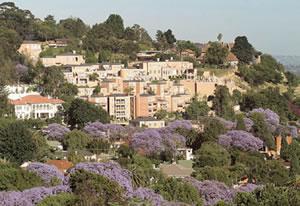 The natural landscape around Johannesburg gives no hint as to why the most important business centre on the African continent should be here. It is only the “mine dumps”, the residue of deep underground mining, that gives the game away.The richest gold deposits in the world were the reason for the existence of Johannesburg, and while today gold is relatively unimportant in the economic life of South Africa, its legacy lives on in this thriving metropolis that remains the commercial capital of the country.
The natural landscape around Johannesburg gives no hint as to why the most important business centre on the African continent should be here. It is only the “mine dumps”, the residue of deep underground mining, that gives the game away.The richest gold deposits in the world were the reason for the existence of Johannesburg, and while today gold is relatively unimportant in the economic life of South Africa, its legacy lives on in this thriving metropolis that remains the commercial capital of the country.
As an essential element to understanding the foundation and the challenges of today’s South Africa, we have a organized a three day program. First arrivals, and first event, a casual dinner with local friends. We will be staying at The Residence Hotel, a 5 star boutique hotel set in gardens in Houghton, the area notable for being the Parliamentary Constituency of the redoubtable Helen Suzman, as well as the current home of the remarkable Nelson Mandela.
Our activities the first full day might include a visit to the Apartheid Museum, to the Hector Peterson Museum in Soweto, to the Constitutional Court and Exhibit Hall, to some Art Galleries, and maybe to some friends’ famous private garden. We will head to the Capital city, Pretoria, on one of the days, and visit the Union Buildings and the Voortrekker Monument. In the evenings, we will meet some interesting South Africans at dinner, and subject to what is playing, attend a theatrical or musical performance.
Day 5-11: Kwa Zulu-Natal
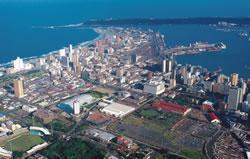 The next day, we will drive to near Ladysmith, famous for the seige during the Anglo-Boer War, in the Province of Kwa Zulu-Natal.
The next day, we will drive to near Ladysmith, famous for the seige during the Anglo-Boer War, in the Province of Kwa Zulu-Natal.
We travel together to discover the varied facets of beautiful Kwa Zulu-Natal, from the rugged mountains of the Drakensberg to the unspoiled coastal dunes, both World Heritage Sites.You will be exposed to the history and culture of the Zulus, the largest of South Africa’s varied tribes. Game viewing is also on the agenda. We will include some great hikes, some swimming and beach-combing, many historical sights; and time for shopping for lovely local crafts. We will again arrange for you to meet some interesting South Africans, here too. We will have lunch at Ladysmith on the way.
We will stay two nights at the Three Trees Lodge at Spioenkop, a lovely lodge in wonderful surroundings, where owners Simon and Cheryl Blackburn will show us some of the wildlife at the adjacent reserve and the next day arrange a visit to the dramatic battlefield of Spioenkop, scene of one of the many British military disasters.
On day 8, we will drive for 2 hours through the rolling hills of Natal, touching the “Midlands Meander”, a famous craft route with many stops offering a wide range of gifts, curios and local produce. A favorite stop of ours is Ardmore Ceramics Studio and Gallery, where this traditional Zulu art form has been raised to a unique level for functional and sculpted ceramics based on a dynamic fusion of African and western artistic traditions. The extravagant and charming ceramics produced by Ardmore are rooted in the identity of the artists and defined by the use of African animal shapes and forms, legends and myths combined with rich colour and exuberant decoration. The Studio now comprises approximately 70 Zulu women, mainly, and men. The grey stone stables on the farm were converted into a ceramic studio in 1990 and it remains as part of the Ardmore Ceramic Art Studio to this day. The works are now rightly famous throughout the world (even Queen Elizabeth II has a piece!).
After lunch in the area, we will take a charter flight to our next destination, the Greater St Lucia Wetland Park, an UNESCO World Heritage Area, where we will head to the Kosi Bay Nature Reserve; we fly over the beautiful coast and over the sugar cane plantations that are one of the important agricultural activities in the province. The unspoiled Kosi Bay Nature Reserve surrounds the rare and beautiful Kosi Bay lake system. It is a tropical paradise of crystal clear water, marshland, swamp and coastal forests that is home to about 250 species of bird. Hippo and crocodile bask in and around the lakes and the reserve provides a haven for a variety of rare fish, flora and fauna. The Kosi lake system has long been regarded as the best-preserved large estuary system on South Africa’s Indian Ocean coastline. Kosi Forest Lodge is the only private lodge in the reserve. The lodge offers thatched bush suites hidden in the sand forest under a canopy of shady trees. The suites are raised on a wooden deck with balcony, dressing room and separate bath and shower. The romantic en-suite bathroom is open-air in a reed-enclosed Boma. That’s right, you can bathe outside! A massive Zulu Podberry tree is the focal point of the main lodge with the lounge, dining room and bar all opening onto a large, wooden deck around the tree. A swimming pool is built into the deck, at the lake’s edge.
Candles light the area at night giving it a warm, romantic ambience reminiscent of wild African adventures of long ago. Activities include guided canoe trips or boat cruises on the lakes, excellent bird-watching, swimming at the Kosi mouth, fishing, guided walks through Raffia Palm Forest, and horse-riding.
We will leave on day 9 for a short drive to Thonga Beach Lodge on a beautiful untouched dune on the Indian Ocean. We will sleep in thatched suites hidden in the coastal dune forest and raised on wooden stilts to protect the sensitive dunes. Inspired by Thonga tribal architecture, our rooms offer extensive views from private balconies of the ocean or the surrounding bush. The proximity with nature and natural materials create an open, airy feel. We will dine outdoors in a large thatched ‘rondavel’ or we will head for the beach and dine by candlelight on the shores of the Indian Ocean. Here, the emphasis is on nature; beach walks, guided walks, scuba diving, bird viewing, and dolphins and maybe whales. After an al fresco dinner in front of the Sea, and a good night’s sleep in the salt air, our activities here will include a choice amongst canoeing on Lake Sibaya, snorkeling, beach-combing, spa treatments, and a visit to a local Zulu School. No one will want to miss Sundowners with hippos on Lake Sibaya or another dinner under the stars followed by a possible night drive to see Loggerhead and/or Leatherback turtles.
On day 11, we will take another charter flight, this time to Durban, the busiest seaport in Africa. Sadly we will only have time for a brief flyover of this sub-tropical city before landing at the King Shaka International Airport for the two hour flight to Cape Town.
Day 11-15: The Fairest Cape
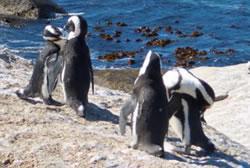 From the Cape Town airport, we will be chauffeured to our Cape Town accommodation, the beautiful Constantia Uitsig Hotel, and have a relaxing but delicious dinner there. We will have three nights at the Constantia Uitsig, set in the vineyards of Constantia, but minutes from the city. “Uitsig” is known for not one, but two excellent restaurants and we will dine the second night at “La Colombe” in a private gazebo. They also have an excellent spa, and delicious breakfasts by a tinkling fountain as well as their own vineyard, and a cricket field.
From the Cape Town airport, we will be chauffeured to our Cape Town accommodation, the beautiful Constantia Uitsig Hotel, and have a relaxing but delicious dinner there. We will have three nights at the Constantia Uitsig, set in the vineyards of Constantia, but minutes from the city. “Uitsig” is known for not one, but two excellent restaurants and we will dine the second night at “La Colombe” in a private gazebo. They also have an excellent spa, and delicious breakfasts by a tinkling fountain as well as their own vineyard, and a cricket field.
On the following day, we will tour the Cape Peninsular, with its beautiful mountains and Mediterranean vegetation, visiting craft shops, the Cape Point Nature Reserve, an excellent seafood restaurant, the Simonstown Naval Base, and a penguin colony, before returning to the cool and calm of Constantia.
On the third day in Cape Town we will decide between the many opportunities available to us, including the “District Six Museum”, the impressive historical “Gardens” where the Parliament is located, and the best private gallery of African Art in the city, owned by a good friend. Those who wish may take the ferry to Robben Island where Nelson Mandela spent much of his 27 years in jail, and the more adventurous will climb Table Mountain. We could take a late lunch at the Cape Town harbour area, the “Waterfront”. We might make an afternoon visit to the National Botanical Gardens of Kirstenbosch on the slopes of Table Mountain, or go up the Table Mountain cable car.
On day 14, we will head out the lovely Cape Winelands. We will visit first the Vergelegen Wine Estate which today is one of South Africa’s best producers. We will have a private tour of the very modern and architecturally interesting winery, a visit to the magnificent XVIII century Homestead and beautiful Gardens, and, of course, a wine-tasting. For the shopaholics, it also has one the best gift shops. After lunch at Vergelegen, we’ll move to Franschhoek, either to laze at the pool, or to visit the impressive Huguenot Memorial and the local shops. We will dine at one of the area’s many interesting restaurants and spend the next two nights at a delightful boutique hotel in either Stellenbosch or Franschhoek (literally “French Corner”) in the gorgeous valley where the French Huguenots were settled and were to make such an important contribution to South Africa’s winemaking. We will dine at a notable restaurant that night.
The next day we will visit some of the 17th and 18th century historic estates and taste some wines.
Day 16-19: The Kalahari Semi-Desert
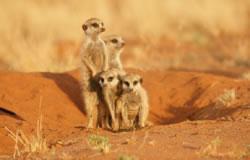 We depart Cape Town by private plane in late morning, to arrive at the Oppenheimer family’s Tswalu Kalahari Game Lodge, where we will be staying at Tarkuni or Motse Lodge. When Nicky Oppenheimer acquired Tswalu, his overall goal was “to restore the Kalahari to itself” and to make Tswalu one of the premier wildlife destinations in Africa as well as a premier South Africa game reserve. The area had previously been farmed with little regard for the environment, and as a result the very essence of the authentic Africa it once was had been almost completely destroyed. However, thanks to the destruction of dams, removal of houses and fences and reestablishment of indigenous game such as cheetah and lion, it is now on the road to resembling the real Africa that nature intended.
We depart Cape Town by private plane in late morning, to arrive at the Oppenheimer family’s Tswalu Kalahari Game Lodge, where we will be staying at Tarkuni or Motse Lodge. When Nicky Oppenheimer acquired Tswalu, his overall goal was “to restore the Kalahari to itself” and to make Tswalu one of the premier wildlife destinations in Africa as well as a premier South Africa game reserve. The area had previously been farmed with little regard for the environment, and as a result the very essence of the authentic Africa it once was had been almost completely destroyed. However, thanks to the destruction of dams, removal of houses and fences and reestablishment of indigenous game such as cheetah and lion, it is now on the road to resembling the real Africa that nature intended.
Activities here include serious game drives in our private Land-rover with tracker and guide, guided bush walks, game viewing on horse, archery, star gazing, sun downers, Meerkat viewing and fantastically soothing massages and spa. The reserve is divided into two parts, one of which has no predators so that game watching on horseback is possible. The scenery and topography are unlike what you wil have seen on the rest of the journey, and you will get a sense of the vastness of the continent at this unique African Relais et Châteaux. This is the largest private reserve in the country – over 100,000 hectares.
After a very special fair-well dinner the previous evening, we will spend our last night in the bush environment. We will all depart Tswalu by private plane around noon on the 19th day. We will fly to Johannesburg Airport in order to catch the evening flights out to elsewhere in the world.
It will be hard to say Good-bye.
Note that some details of the arrangements may be changed. Our groups consist of a minimum of 6 and a maximum of 12 guests.







